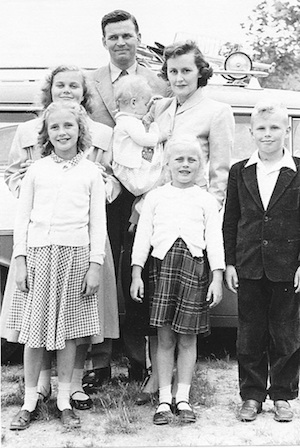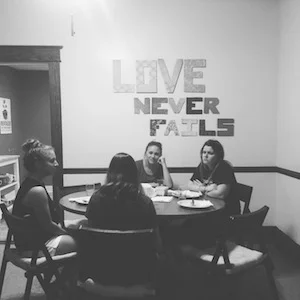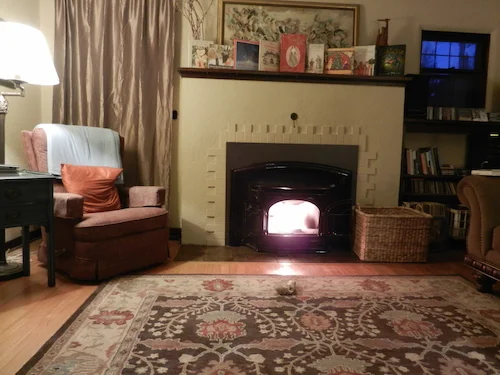In the Name of the Father

When I tell people I had Atticus Finch for a father I get one of two reactions. The first is polite silence. Um, sure you did. People like that exist only in the movies. More typical is the second response — bemused wonder. I often hear a chuckle, and intuit a wistful longing for someone in their own past to reincarnate as Gregory Peck in his iconic role. My father, Ray Appelquist, son of Swedish immigrants, with his shock of brown hair and classy airs, actually was mistaken for Gregory Peck— as well as Cary Grant — more than once at airports around the world. Someone walking down the street addressed him as Mr. Kennedy once when he worked on Capitol Hill. Who knows which brother they meant, but they saw someone elegant and important. He was so handsome and courtly that people took notice.
But it was his quiet reserve, his salt-of-the-earth goodness, his humility, and his utter lack of pretense that drew the comparison for me to Harper Lee’s saintly hero, whom she modeled after her own beloved father. My dad was not a Southern lawyer striving for racial justice in a poor, backwater town; rather a Midwest preacher’s son, the oldest of five children, who grew up to be a Baptist minister, then an Army chaplain, and the father of five children himself, the fourth being me. He called me Lulie, a Swedish nickname from my middle name Lou. I adored him. When I was five we lived in Colorado Springs where he was the Protestant chaplain at Fort Carson. He would stand with his arm outstretched at the pulpit just before the service ended and bless the congregation with words whose poetry imprinted in my brain, as if God Himself were speaking them:
The Lord bless you and keep you; The Lord make His face to shine upon you and be gracious to you; The Lord lift up His countenance upon you, and give you peace. (Numbers 6:24-26)
I did not know then nor do I know now the full nature of God. No one does, but we’re given glimpses through the revelation of nature, the testament of history and its saints, and especially through the ordinary people who love us and mark our days. As a child my earthly father represented whatever goodness, safety, and unconditional love there was to be found in this world. And that has everything to do with why I call myself a Christian today, and can still refer to God as Father, problematic though it may be for me as a 21st-century woman. I can accept gender specificity as limited and limiting metaphors of the Divine. No single noun or finite image, however truthful, can convey a complete picture or tell the whole story. Jesus as good shepherd works well for me. So does Jesus as mothering hen weeping for Jerusalem. So does God as elemental Spirit of wind, fire, water, and an inner still, small voice. But ultimately, our language and its constructs will never be spacious enough to contain the ineffable.
The first poem I ever had published in 1991 was about my father and those years in Colorado:
Suede Jacket
Where it might be now,
tucked among old sweaters
in a musty trunk,
or hanging
at the very back of your closet
beside army dress
and long, black preacher’s robes,
is a mystery.
But I can still smell it,
that sweet tawny softness
against my cheek
as you carried me inside
the house, half-asleep
from the movement
of gears shifting rhythmically
in our blue Chevy wagon,
your shoulder
my shield against the world.
Several years ago we lingered over dinner in our friends’dining room in Corvallis and the topic turned, as it often did with these particular friends, to theology—what we still believed, what we’d rejected or reconfigured. I casually remarked that I probably wouldn’t cling to belief in a Biblical “God the Father” if my own father hadn’t been such a gem. I went on to say how if I’d had a neglectful, mean, or abusive father I’d have likely lost my faith long ago.
An awkward chill followed. No one spoke at first. Then my friend shared how she’d had just such a father. She was a survivor of childhood sexual abuse — she and her sister both. Her father was the well-off owner of a luxury car dealership in another state. Successful, handsome, important in the community. She described how on a recent trip to the Oregon Caves further south from us, she could not stay below without feeling terrified, claustrophobic. She begged to leave the tour with her husband because the winding dark passageways and hidden specters in the shadows underground conjured up horrific memories. I sat stunned at the table and tried to stammer an apology.
She said simply, “It’s okay. You didn’t know.”
Her husband jumped in to rescue us. “Fortunately,” he said, “our notions of God stem from much more than what our fathers were like. Mine was a brute too.” But long after we left their house the question haunted me: why did I get the prince and she got the monster?
* * *
Korea, 1951–1953, was my father’s proving ground. It was where he honed his pastoral skills at the bedside of wounded young men, where he counseled and consoled, preached and prayed, all the while shivering in his tent at night and trying to remember why he left a wife and four little children at home.
My dad was gone for long periods of time when I was growing up. The first stretched into nearly two years while he was in Korea. I was just a baby then, but I missed him in ways that very young children do. We internalize our loss. We carry a vague sense of absence, of something gone we don’t fully remember, only that it was crucial.
We also moved a lot, seven major moves by the time I was twelve years old, way too much for a highly sensitive introvert. Belonging became one of the great themes of my life. If I can fault my father for anything looking back, it’s that — why did you have to move us so much? The Army doesn’t grant you a choice in these matters, but even post-military life we kept on moving for his career advancement, better jobs with better pay. Dad had a large family to support. I never felt like we had a hometown or came from anywhere specific. And I hated being the new kid in so many different schools. I always envied those who had deep roots to a particular place.
“We’ve made rolling stones out of our kids, Ray,” my mother used to say, during our restless teenage and young adult years. Wandering felt normal. Staying put did not.
* * *
One of my favorite things to do as a kid with my father was to watch the news together. I’m sure it served to get me out of helping my mom in the kitchen too. I would look at his face as much as the TV screen to gauge his reaction to whatever the anchorman was talking about. He preferred John Chancellor at NBC and later, Tom Brokaw, and later still, Brian Williams.
When the Cuban missile crisis happened we were living in Virginia, just outside D.C. His face, usually calm and relaxed, grew serious and tense. Night after night I sat by his side on the floor as the situation worsened and President Kennedy tried to reassure the American people. I knew something scary and dangerous was happening between us and the Russians. Hidden silos in Cuba loomed large. Our proximity to Washington made everything seem much more ominous. My father’s knowledge on many subjects and his vast recall of history made him seem all-wise and unflappable, or so I thought, and therefore he would know how to find a way through the worst events life could deliver. I was sure he knew what to do about Cuba, even if Kennedy didn’t.
Years later I told my father about this memory. He laughed and said, “No, I had no clue what would happen next. I was as scared as the rest of us. I just didn’t want you to be.”

I came of age during the waning years of the Vietnam War, a shy, would-be flower child on the fringes of the Woodstock generation, torn between my love and respect for my conservative evangelical parents and my emerging cultural sensibilities that leaned decidedly to the left of theirs.
My father’s job in Washington, the pinnacle of his career, was executive director of an organization that served as a liaison between military chaplains, the churches, and branches of government. His office was a stately historic mansion right across the street from the Supreme Court Building. He dealt on a first name basis with all the heads of Protestant denominations, some well-known Catholic cardinals and bishops, Jewish leaders, and even Pentagon personnel. He traveled in circles that would have astounded his own father. Meanwhile I was going to anti-war marches with my friends (think Forest Gump), listening to Sgt. Pepper and Jefferson Airplane, and reeling with confusion and the angst of that era. But my love for my father never wavered. Even though I had quit going to church and barely prayed, he was my rock.
During Vietnam someone once asked him why would you send chaplains into a misguided war we were clearly losing? He answered calmly, “For the same reason we send doctors and nurses to battlefields. Regardless of what they may think of the war, the chaplains are there because the troops are there.”
My father spent his early life in small, rural farm communities in Minnesota, Kansas, and Iowa, shaped by the hardships of the Great Depression and two major wars. He never took anything for granted, had a deep sense of duty and compassion, and practiced the art of gratitude long before it became popular. “Don’t feel guilty,”he’d say, “feel grateful. And be generous.” He held strong opinions but never flaunted them or made you feel yours weren’t important. A man of daily prayer who loved to read the devotions of John Baillie, the great Scottish preacher, he was one of the best listeners I ever knew. People sought him out to solve thorny church-state issues, as well as private matters. He would’ve made a great ambassador.
My parents’ long marriage lasted for 67 years. They met at Bethel College in St. Paul where my father attended seminary. My mother battled Parkinson’s the last twelve years of her life, with my father as her primary caretaker until he could no longer manage. She moved into a nursing home down the street from their little yellow house in Mt. Dora, Florida. He continued to visit her faithfully every day, feeding her at meals and talking to her in a voice soft as butter. But his lifetime companion had morphed into a disease-ravaged shell of the lovely woman he married so long ago.
“How do you say goodbye to someone you’ve known for 70 years?” he remarked one day, as she was nearing the end. She died on Good Friday, 2011. In many ways they were an odd couple, so different in temperament and personality, yet they made their marriage work, calling each other best friend and traveling to all the places they once lived in the U.S. in their big white Chevy van before that became impossible. They would reminisce for hours on their road trips about churches, kids and grandkids, books, food, politics, music, anything. When my mother finally died my father’s last task on earth ended. He was spent, and the love of his life gone. He lasted one more year and died on June 20, just three days after his 94th birthday.
That was three summers ago. It’s taken me this long to be able to write anything about him. The last time I saw him alive was in that same nursing home in Florida. My four siblings and I had come from many places to say our goodbyes. He had lost about thirty pounds and sat upright in bed, propped with pillows where his blotchy purple forearms rested. Out of habit, he was half-watching the Nightly News with Brian Williams. We welcomed it as background noise to hold at bay the thundering pain in our hearts, my brother and me.
I kissed his forehead. It felt like a baseball had lodged in my throat and I could neither swallow nor speak. His hair, a flat white sheet, looked like Carl Sandburg’s, a poet he loved and had once memorized. He loved John Greenleaf Whittier and Rupert Brooke too, writers whose work might be labeled passe and sentimental today. For all his sophistication, world travel, and hobnobbing with senators and military brass in Washington, my dad remained a simple man with simple tastes. Technology befuddled him (a trait we surely share). He loved plain, black coffee and warm apple pie. He liked working on huge puzzles and watching golf on TV. Canned peaches were the only thing he wanted to eat in that last week of his life. His heroes were people like Dietrich Bonhoeffer, Dag Hammerskold (UN Secretary General in the 1960s), and Martin Luther King, Jr. I still remember him reading out loud to us at our dining room table in Virginia, King’s “Letter from a Birmingham Jail.”
Lately I’ve been trying to write poems that spring from dormant memories buried deep in the furrows of childhood. Some involve my father. Not a day goes by that I don’t miss him and imagine him still in that little yellow house. Even the color yellow can jog a memory or bring on tears. It was his favorite. Writing provides a way to keep him alive, to return him to the flesh and blood person whose sermons and war stories I heard, whose lap I sat on, whose pralines I ate, whose books I borrowed, whose cars I drove, whose wisdom I sought, whose voice I still have on my answering machine: “This is an old grandpa down in Florida, wondering if he’s still got any relatives in Corvallis. You can call me anytime. I’ve had my nap. Be good to yourself.”




















